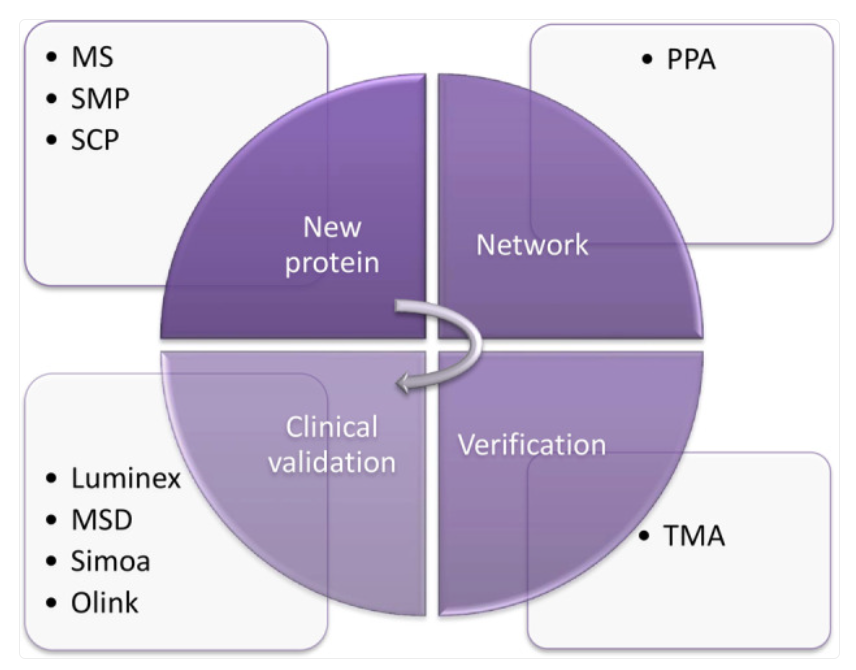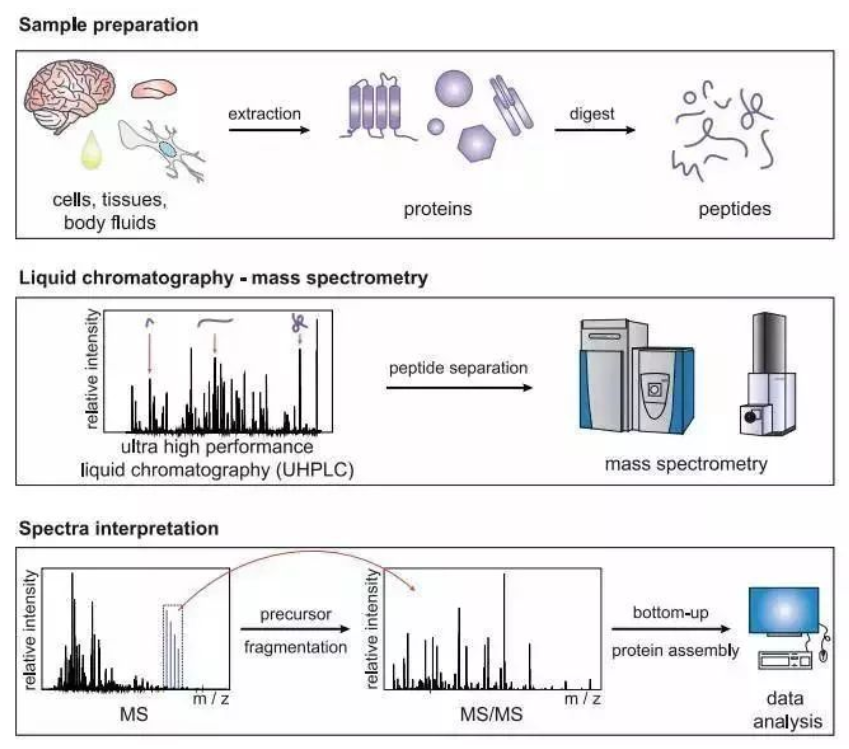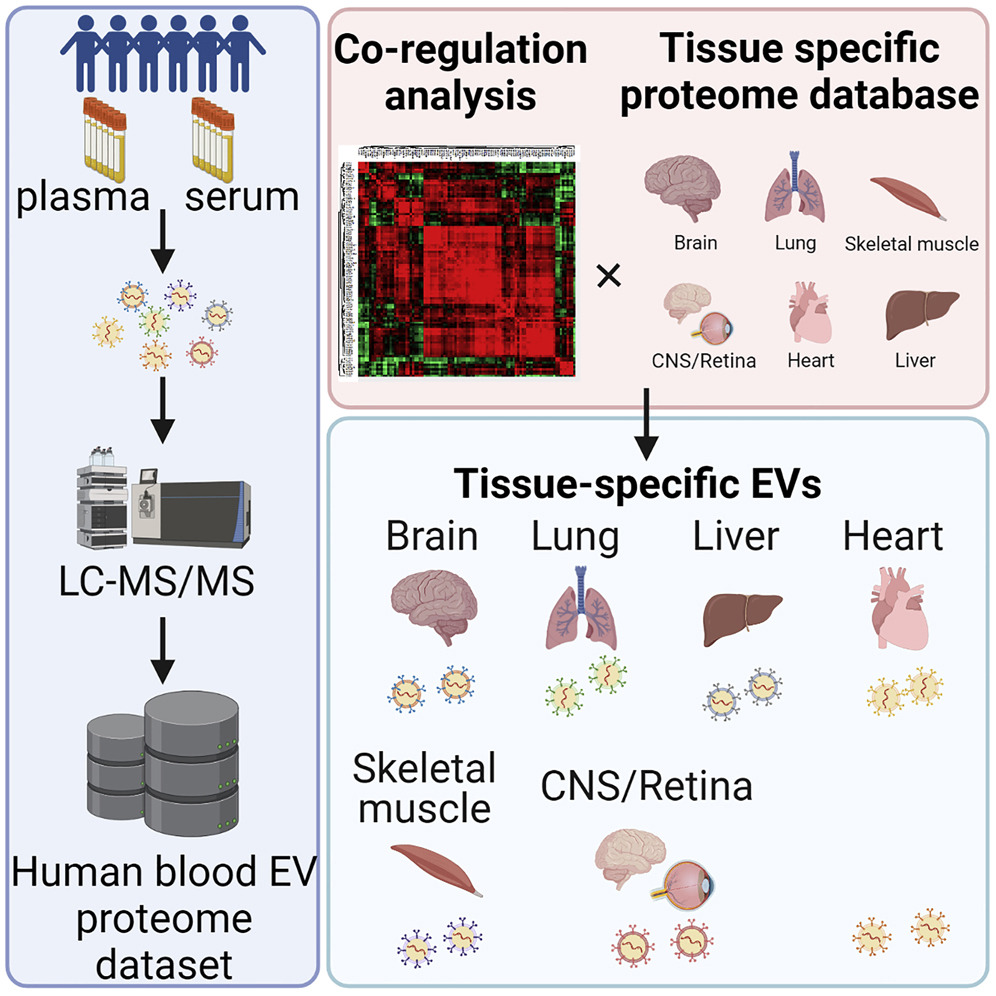High Throughput Proteomics Service
High throughput proteomics is an essential research approach in the field of proteomics. Utilizing advanced mass spectrometry technology and highly efficient protein separation techniques, it is dedicated to comprehensively investigating the protein landscape within biological samples. Simply put, it enables the simultaneous processing of vast amounts of protein information, precisely identifying various proteins from complex biological samples such as tissues, cell culture media, and body fluids, while quantitatively analyzing their abundance. High throughput proteomics service facilitates the analysis of protein abundance changes within cells, diverse post-translational modifications, and precise subcellular localization, all of which are closely associated with protein biological functions. Through large-scale parallel analysis, this technology can sensitively capture subtle changes and dynamic trends in protein expression under different developmental stages, environmental stimuli, and disease progression.
Over the past decade, significant advancements in experimental techniques have propelled proteomics from traditional methods such as immunohistochemistry (IHC) staining, Western blotting, and enzyme-linked immunosorbent assays (ELISA) to high throughput approaches, including tissue microarrays (TMA), protein pathway arrays, and mass spectrometry analysis. These high throughput proteomic technologies not only reduce analysis time but also enhance the accuracy and depth of proteome coverage. With the rapid development of bioinformatics and modern multi-omics analytical technologies, high throughput proteomics service holds immense potential for uncovering the molecular mechanisms of diseases and identifying novel biomarkers. Additionally, they serve as valuable tools for diagnostic testing, prognostic prediction, and therapeutic target discovery, further advancing the field of personalized medicine.

Cui, M. et al. Lab Invest, 2022.
Figure 1. High Throughput Proteomics Techniques.
Services at MtoZ Biolabs
Leveraging Thermo’s Orbitrap series mass spectrometers combined with the Nano-LC system, MtoZ Biolabs provides high throughput proteomics service with exceptional data acquisition precision and sensitivity. The primary service components include:
1. Sample Processing and Preparation
Proteins are extracted from various biological samples, including cells, tissues, and body fluids, followed by enzymatic digestion, reduction, and alkylation to obtain peptide mixtures suitable for mass spectrometry analysis. For tissue samples, preprocessing steps such as homogenization and lysis are performed prior to protein extraction and subsequent preparation.
2. Mass Spectrometry Analysis
High-resolution and high-sensitivity mass spectrometry is utilized to detect peptides, providing mass-to-charge ratio (m/z) and intensity information, enabling protein identification and quantification. Commonly employed mass spectrometry techniques include matrix-assisted laser desorption/ionization mass spectrometry (MALDI-MS) and electrospray ionization mass spectrometry (ESI-MS).
3. Protein Identification and Quantification
Mass spectrometry data are analyzed by matching detected peptides to known protein databases to determine protein composition within samples. Both relative and absolute quantification methods are employed, including labeling techniques such as TMT and iTRAQ, as well as label-free approaches.
4. Bioinformatics Analysis
Comprehensive bioinformatics analysis is conducted on identified and quantified protein data. This includes differential expression analysis, clustering analysis, functional enrichment analysis, and protein-protein interaction network analysis, providing insights into the role and regulatory mechanisms of proteins in physiological and pathological processes.

Hosp, F. et al. Neuron, 2017.
Figure 2. High Throughput Proteomics Process.
Service Advantages
1. High Sensitivity
MtoZ Biolabs has developed a specialized platform for removing high-abundance proteins, enabling the identification of low-abundance proteins in body fluids.
2. Wide Application Scope
Proteomics analysis can identify various types of proteins, including membrane proteins, nuclear proteins, and extracellular proteins.
3. High Throughput
Our high throughput proteomics service can simultaneously analyze up to 96 samples, making it particularly suitable for differential protein analysis across multiple treatment conditions or time points.
4. Post-Translational Modification (PTM) Detection
MtoZ Biolabs offers a comprehensive suite of PTM analysis services, including phosphorylation, ubiquitination, and glycosylation, enabling high-throughput modification proteomics studies.
5. High-Quality Data
Our data coverage is extensive, with stringent quality control measures. MtoZ Biolabs' AI-driven bioinformatics platform integrates all high-throughput proteomics data to provide a comprehensive data report.
6. Customized Research Solutions
MtoZ Biolabs offers tailored services to meet your specific research needs and experimental requirements.
Sample Submission Suggestions
1. Sample Types
We accept nearly all types of biological samples, ensuring optimal preservation to maintain protein integrity and spatial distribution.
2. Sample Amount
A minimum of three biological replicates is recommended.
Note: If you have specific requirements or need assistance with sample preparation, please contact us.
Applications
1. Biomedical Research
Used for disease diagnosis by comparing protein profiles between healthy and diseased samples, identifying biomarkers such as PSA in cancer detection. It also aids in exploring disease mechanisms, such as analyzing protein changes in pancreatic islet cells in diabetes. Additionally, it supports drug development by identifying therapeutic targets, evaluating efficacy, and assessing side effects.
2. Agriculture
In crop improvement, analyzing protein changes in plants under different environmental conditions and growth stages helps in breeding stress-resistant varieties. In food quality assessment, detecting protein content and composition in dairy products, wheat, and other agricultural goods enables quality evaluation.
3. Microbiology
Used for microbial classification and identification based on protein expression patterns. It facilitates the study of pathogenic mechanisms by identifying virulence proteins in pathogenic microorganisms. It also enables the exploration of environmental microbes, providing insights into community interactions and nutrient cycling functions.
4. Fundamental Biology
High throughput proteomics is applied to study cellular physiology, elucidating protein dynamics during proliferation and differentiation. It also allows for the construction of protein interaction networks, illustrating how proteins collaborate within cellular systems.
Case Study
1. Comprehensive Proteomic Analysis of Phosphatidylserine-Positive Extracellular Vesicles in Plasma and Serum Reveals Tissue-Specific Proteins
This study focuses on phosphatidylserine-positive extracellular vesicles in plasma and serum, Researchers use high throughput proteomics service to conduct a comprehensive proteomic analysis. Initially, relevant samples were collected, and the target vesicles were enriched. Subsequently, this technology was employed to perform large-scale identification and quantification of proteins within these vesicles. Through bioinformatics analysis and experimental validation, tissue-specific proteins were screened and confirmed. Finally, the study explores the potential applications of these tissue-specific proteins in disease diagnosis, treatment, and physiological processes, aiming to provide potential biomarkers and therapeutic targets for related fields. Overall, this research seeks to uncover the value of the proteins contained within these extracellular vesicles.

Muraoka, S. et al. iScience, 2022.
Figure 3. Understanding the Specific Applications of High Throughput Proteomics.
Deliverables
1. Comprehensive Experimental Details
2. Materials, Instruments, and Methods
3. Total Ion Chromatogram & Quality Control Evaluation
4. Data Analysis, Preprocessing, and Estimation
5. Bioinformatics Analysis
6. Raw Data Files
MtoZ Biolabs, an integrated Chromatography and Mass Spectrometry (MS) Services Provider, provides advanced proteomics, metabolomics, and biopharmaceutical analysis services to researchers in biochemistry, biotechnology, and biopharmaceutical fields. Our ultimate aim is to provide more rapid, high-throughput, and cost-effective analysis, with exceptional data quality and minimal sample consumption. Free project evaluation, welcome to learn more details!
MtoZ Biolabs, an integrated chromatography and mass spectrometry (MS) services provider.
Related Services
How to order?







